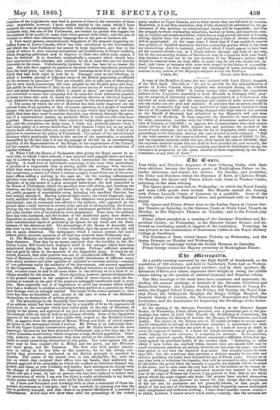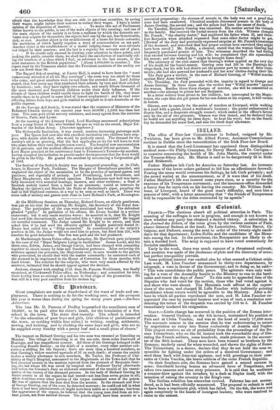be itnetrop oils.
At a public meeting convened by the High Bailiff of Southwark, on the requisition of 180 electors, and held in Southwark Town-hall on Wednes- day, the Chartists attended in great numbers; and by their speakers, Mr Bronterre O'Brien and others, expressed their delight at seeing the middle classes taking up the question of national economy and financial reform.
The May meetings of the week have been numerous and important; in- cluding the annual meetings or festivals of the Servants Provideut and Benevolent Society, the London Society for the Protection of Young Fe- males, the Ragged School Union, the Foreign Aid Society, the Royal Lite- rary Fund, the Orthopmdic Hospital, the King's College Hospital, the Scottish Society of London, the Newsvenders' Benevolent and Provident Institution, and the Association for Improving the Dwellings of the Indus- trial Classes.
At the meeting of the Servants Provident Society, in the Hanover Square Rooms, on Wednesday, Prince Albert presided; and a prominent part in the pro- ceedings was taken by Lord John Russell, the Archbishop of Canterbury, the Bishop of London, the Bishop of Oxford, the Marquis of Westminster, and Lord Ashley. The objects of the Society are-1. To enable servants to secure annui- ties for themselves in old age on Government security; 2. endowments for their children at fourteen or twenty-one years of age; B. a sum of mousy at death to cover the expense of burial; 4. a home for female servants oat of place, and a model lodging for male servants; 5. a registry for servants. In his excellent, clear, and practical speech, Prince Albert explained a difficulty which had ope- rated against the provident habits of the servant class. " Acoording to tables which I have before me, anybody whose income does not exceed 1501 may by small instalments purchase an annuity deferred not less than ten years, but after that period to any time the depositor may name. One annuity cannot be more than 301; but the annuitant may purchase a distinct annuity for his wife and children providing the latter have attained the age of fifteen years. Should he at any time wish to withdraw his deposits, they will be returned to him; and shottld he die before the period when the annuity is payable, his deposits will be rammed to his heirs; and in such cases the only loss will be the interest on the money de- posited. Although this wise and benevolent measure was enacted in the third year of the reign of William the Fourth, I am grieved to find, that in the whole period which has since elapsed only about 700 persons have availed themselves of its provisions. I can :discover no reason for this, except that the existence of the act and its provisions are not generally known, or that people are afraid of law and acts of Parliament, because they frequently cannot understand their complicated and technical wording. I have heard another reason stated,— to which, however, I cannot attach much credit,—namely, that the servants are afraid that the knowledge that they are able to purchase annuities, by saving their wages, might induce their masters to reduce their wages. I have a better opinion of the disposition of masters. . . . To make this act of Parliament better known to the public, is one of the main objects of this meeting; and one of the main objects of the society is to form a medium by which the domestic ser- vants may acquire for themselves the objects held out by the act, free from trouble, risk, or cost. Another object is the establishment of a home for female servants; the usefulness of which hardly requires a word of commendation on my part. Another object is the establishment of a model lodging-house for men-servants mot lodged by their masters; and the last is a registry for servants out of place.
• . . If we should only succeed in drawing your attention to these points, and making the public consider them, we shall have the satisfaction of materially aid- ing the interests of a class which I find, on reference to the last census, is the most numerous in the British population.' [About 1,000,000 in number.) The report read by the Treasurer stated that the Provident members of the society are now not fewer than 90.
The Raeged School meeting, at Exeter Hall, is stated to have been the "moat numerously attended of all the May meetings"; the room was too small for those who came, and great numbers were turned from the crowded door. Lord Ashley stated, that four years ago they numbered their schools by tens and their scholars by hundreds; now, they have eighty-two schools, and nearly fifteen thousand of the most destitute and forgotten children under their daily influence. If the friends of these children would enable them to fight the battle of life, they must enable them to be placed in some kind of honest employment: and he read some affecting letters from boys and girls enabled to emigrate to South Australia at the public expense.
At the Foreign Aid Society, it was stated that the expenses of Ministers of the Reformed Church during the current year were 50,0001.; 1,1001. less than last year. This sum paid about seventy ministers, and many agents from the societies of Geneva, Paris, and Lyons.
At the meeting of the Literary Fund, Lord Hardinge announced subscriptions from a young friend of his, who wielded the pen as well as the sword, Major Ed- wades of the Indian Army. (Immense applause.) The Orthopaedic Institution, it was stated, receives increasing patronage each year. The Queen had sent into this excellent institution two children born crip- ples, with double club-feet, who would be perfectly cured. The demand for the society's aid is so pressing, that the last applicants on its list will have to wait two years before their tarn for admission comes. The hospital now accommodates 36 in-patients, and the medical officers attend daily about 100 ont-patients. The Lord Mayor presided at the anniversary feast in Freemason's Tavern—by accident, having accepted the invitation to preside under the impression that the feast would be given in the City. He graced the accident by announcing a Corporation gift of 1001.
The festival of the Scottish Society was an inaugural proceeding, at its Club- house, in Hanover Park, Peckham. The Marquis of Breadalbane presided, and explained the object of the association to be the practice of national games and stimes, and especially of archery. Lord Drumlanrig, Lord Feversham, and Cluny Macpherson, also delivered speeches. The handsome new hall was taste- fully decorated with armorial bearings, banners, and other emblems: a flood of Scottish melody issued from a band in an anteroom; varied at intervals by Mackay the Queen's and Macbeth the Duke of Sutherland's piper, parading the hall in full Highland costume, in a way to be seen as well as heard. There was some talk of archery and games next June in Lord Holland's Park, at Kensington.
• At the Middlesex Sessions, on Thursday, Richard Evans, an elderly gentleman, was put on his trial for assaulting Mr. Knight, the Secretary of the Royal Aca- demy. The particulars of the case were mentioned last week. The defendant pleaded "guilty." In palliation of his offence, Mr. Evans handed in a written statement; but it only made matters worse: he asserted in it, that Mr. Knight had used him discourteously, and had called him a "dirty scoundrel." He begged for merciful treatment. The Judge caused Mr. Knight to be sworn, and then asked him if he had used the offensive epithet? Knight positively denied it: Evans had called him a "filthy scoundrel." In consideration of the culprit's position in life, the Judge would not send him to prison, but fined him 251., with sureties for good behaviour. The fine was paid and the bail produced.
At Marlborough Street Police-office, on Saturday, Mr. Hard wick gave judgment in the case of the "Royal Belgrave Lying-in Institution." James Locke, and his three sons, Edwin, James, and George Curtis, had been charged with conspiring together to obtain money by false and fraudulent pretences. After reviewing the evidence against the prisoners, the Magistrate said, to save trouble to the parties who prosecuted, he should deal with the matter summarily: he sentenced each of the accused to be imprisoned in the House of Correction for three months, with hard labour. The solicitor for the culprits, who were very much affected by the sentence, intimated that he should appeal against the decision.
Jackson, charged with stealing 1751. from St. Pancras Workhouse, was finally examined, at Clerkenwell Police-office, on Wednesday; and committed for trial, there having been no attempt at a defence in that stage of the prosecution. He was still in a very poor condition from his broken leg.



























 Previous page
Previous page